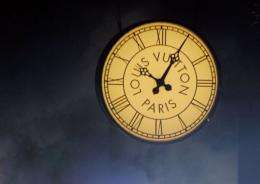70 more websites seized in US copyright crackdown

US authorities seized 70 websites suspected of selling counterfeit goods using luxury brand names such as Louis Vuitton, Tiffany or Burberry and sports logos like NFL and MLB, officials said Thursday.
The seizures under five separate warrants in US courts is the latest action of Project Copy Cat, an effort of the US Department of Homeland Security's Immigration and Customs Enforcement (ICE) office.
ICE director John Morton told AFP that the latest seizures included some highly sophisticated operations, which created websites that looked nearly identical to legitimate ones.
"These are copycat sites, it is a very sophisticated effort to masquerade as the legitimate site," Morton said. "It is not getting people to buy cheap knockoffs, it is getting people to pay full price or nearly full price."
Some sites also use a fake SSL (secure sockets layer) certificate that leads customers to believe their credit cards are encrypted, officials said.
"This allows people to believe their financial information is encrypted but that seal is counterfeited as well," ICE spokesman Justin Cole said.
Since the effort began in 2010, a total of 839 websites or domain names have been seized.
This includes websites using the name louisvuittononlineoutletus.com or tiffanyandcojewelrysale.net, aimed at deceiving consumers into thinking they are purchasing legitimate goods from Tiffany or Louis Vuitton.
Many of the goods are counterfeit items made in China, officials said.
Morton said cooperation with Chinese authorities is "uneven, but it is getting better."
"There is a distressingly high level of this activity coming out of China," he said.
The seized sites, all hosted in the United States, have their front page replaced with images of federal seals from the US Departments of Justice and Homeland Security.
Visitors to the sites are met with a message reading: "This domain name has been seized by ICE -- Homeland Security Investigations, pursuant to a seizure warrant issued by a United States District Court."
Cole said the owners of the websites have an opportunity to contest the seizure in court by showing they are selling legitimate goods.
"But in the most cases these are counterfeit producers and this is not happening," he said.
"In many cases these guys start up a new website and we have to find them again."
Of the 769 previous domain names seized, 229 have now been forfeited to the US government, officials said.
During the operation, federal agents made undercover purchases of a host of products, including baby carriers, professional sports jerseys, language and fitness DVD sets, and a variety of clothing, jewelry and luxury goods.
In cases where the goods were confirmed to be counterfeit or otherwise illegal, authorities went to court to obtain warrants to seize the domain names for the websites.
The probe stems from an intellectual property task force set up by the Justice Department.
Pending legislation would give US authorities even more tools to crack down on "rogue" websites accused of piracy of movies, television shows and music and the sale of counterfeit goods.
The bills have been backed by the Motion Picture Association of America, the Recording Industry Association of America, the US Chamber of Commerce and others.
But they have come under fire from digital rights groups and Internet heavyweights such as Facebook, Google, Twitter and Yahoo! who say they raise censorship concerns and threaten the architecture of the web.
(c) 2012 AFP




















